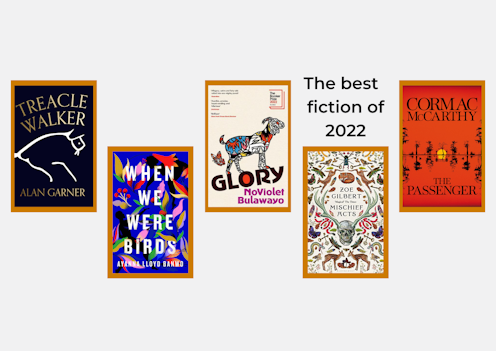
In 2022, we saw Annie Ernaux win the Nobel prize for literature for her uncompromising writing about her experiences. Shehan Karunatilaka won the Booker prize for his darkly comic Sri Lankan political satire, The Seven Moons of Maali Almeida.
There were also a series of screen adaptations and spin-offs that brought us back to some of our favourite books. The new Lord of the Rings series Rings of Power gave fans an opportunity to delve further into Middle Earth, discovering all the lore and world building that Tolkien meticulously laid out in his books.
Netflix also took on the challenge of adapting D.H. Lawrence’s searing tale of passion across the class divide, Lady Chatterley’s Lover. The film is a sweet love story but the book is a powerful thing worth reading, especially in our climate of strikes.
It was a year of great reading, so choosing the best fiction released in 2022 was a difficult feat. Our academics have read hundreds of books this year and out of those, we have managed to pluck these five.
Glory by NoViolet Bulawayo
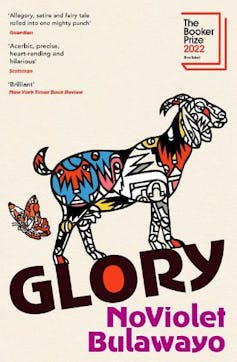
Set in the animal kingdom of Jidada, Glory begins with a coup that ousts the “Old Horse”, bringing an end to his 40-year rule. Hope quickly turns to despair, however, as corrupt leader is replaced by corrupt leader.
Bulawayo notes in the book that Glory is an Animal Farm-inspired satirical account of Robert Mugabe’s four decades in power as prime minister and then president of Zimbabwe. However, as the postcolonial and global literature scholar Jenni Ramone writes:
If Glory is a version of Animal Farm, it’s a global one that acknowledges the impact of colonialism, post-independence corruption and violence and the continued threat from neocolonialism.
Bulawayo weaves this narrative in a stylistically experimental way using tweets and excerpts from videos that mimic oral storytelling techniques. It’s a dynamic story which is at times humorous and at others hard to read in its unflinching descriptions of violence.
Read more: The best fiction of 2022: NoViolet Bulawayo's Glory found new ways to write about violence and peace
Mischief Acts by Zoe Gilbert
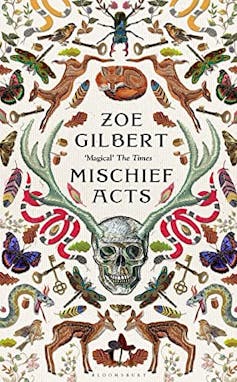
“How many Britons can tell you what a boggart is, or where you might see a will-o’-the-wisp? Who can tell you about standing stones or the Green Man?” writes literature scholar Joe Bedford.
Zoe Gilbert wants us to remember, and with Mischief Acts she retells these stories and imbues them with newness as she mixes folklore, poetry and song to re-enchant our natural myths.
Characters like Herne the Hunter, Puck and Robin Goodfellow play their cruel games with humanity across the generations. The stories snake from the days of forest-dwelling right through to the modern information age and attempt to peak into our uncertain future.
Mischief Acts is an extraordinary and ambitious book that hopes that its readers will understand the urgency of climate change and pay more attention to the natural world.
Read more: The best fiction of 2022: Zoe Gilbert’s Mischief Acts and reclaiming the myths of the natural world
Treacle Walker by Alan Garner

Time is slippery in this book about a boy living in his own world. The book’s hero Joe seems to have no parents or guardians. He measures time by the passing of Noony, a train that goes by at what we must suppose is noon.
There is a rhythm to Joe’s unconventional life, which is interrupted when a rag-and-bone man appears named Treacle Walker. Their unlikely friendship sets Joe off on a wild adventure as he tries to understand the mysteries of his world where myth and folklore converge with physics and time.
Treacle Walker is about understanding our place. “In his book of essays The Voice That Thunders (1997) [Garner’s] best advice to other writers is to ‘know your place’. By which, of course, he does not mean where you doff your cap, but develop your understanding of where you are and through that perhaps something of who you are,” writes creative writing scholar Anna Robinson.
Read more: The best fiction of 2022: Alan Garner’s Treacle Walker and writing outside the constraints of time
When We Were Birds by Ayanna Lloyd Banwo
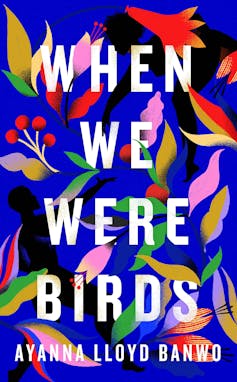
When We Were Birds is a love story ripe with Caribbean folklore and magic realism. Set in Trinidad, it follows a Rastafarian grave-digger and a girl who can speak to the dead, and is a powerful exploration of trauma, legacy and inheritance – with a dash of crime for good measure.
Laden with proverbs and lore and written in a lilting Trinidadian English, Ayanna Lloyd Banwo’s writing is rhythmic and seductive, carrying the reader along.
“[When We Were Birds] opens with protagonist Yejide sitting on her grandmother’s lap as she tells her a story that opens ‘there was a time before time’. Because of the text’s strong narrative voice, it feels like the reader stays on that lap throughout the novel,” writes Caribbean literature and cultures scholar Leighan M Renaud.
The Passenger by Cormac McCarthy
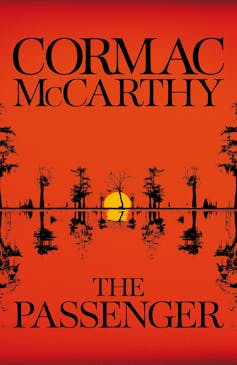
In his 13th book, Cormac McCarthy is flexing his literary muscles, letting readers know that despite his old age his prose is still dynamic, his mind is still sharp and he is unafraid of plunging depths he has not reached before.
A romping southern gothic thriller, The Passenger follows Bobby Western, a man haunted by his complicated past, as he travels from New Orleans to the Florida coast searching for the truth about a sunken jet and its missing passenger.
“Suspense and science, punning and lyricism, hallucination and incest: the novel splices these and other strands together, generating what [the literature scholar Edward Said] calls the ‘non-harmonious, non-serene tension’ typical of a writer’s late style,” writes lecturer in American studies Andrew Dix.
Read more: The best fiction of 2022: death and life in Cormac McCarthy's The Passenger
This article was originally published on The Conversation. Read the original article.







